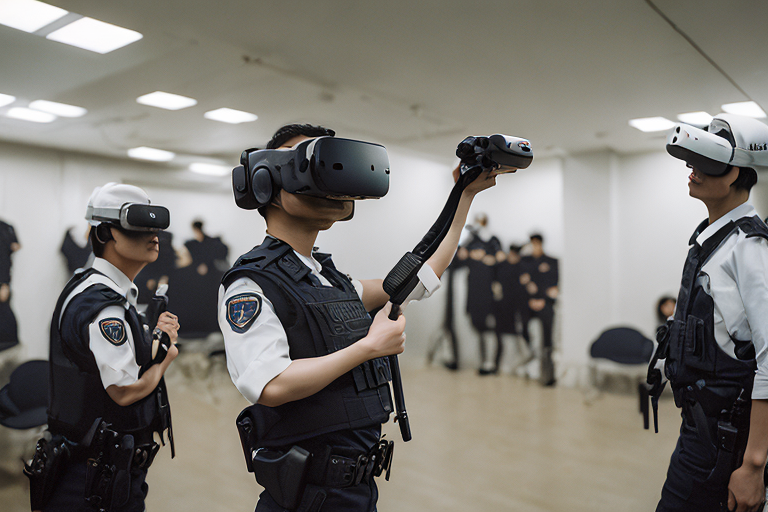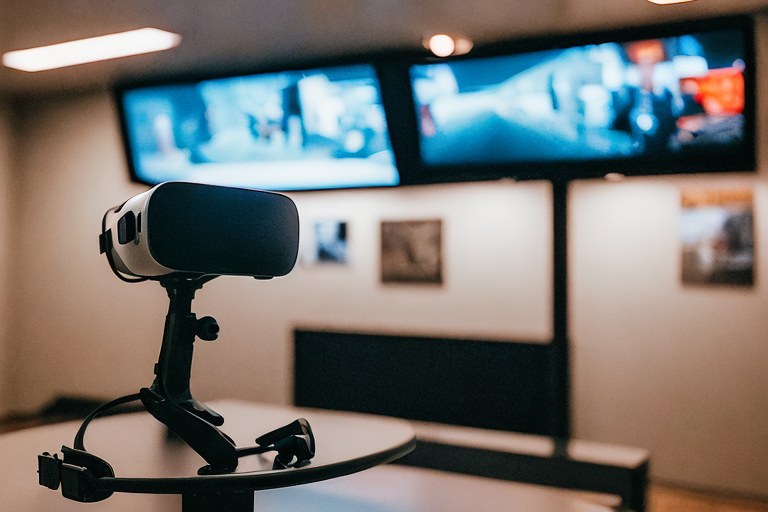국토 보안 산업의 가상 현실(VR): 대테러 및 위기관리 개선(Virtual Reality in the Homeland Sec…
본문

가상현실(VR) 기술은 많은 산업에서 큰 파장을 일으키고 있으며, 국토 보안 산업도 예외가 아니다. 최근 몇 년 동안, VR은 공공을 보호하는 법 집행 기관과 다른 조직의 훈련과 운영을 향상시키는 데 사용되었습니다. 이 분야에서 VR을 사용하면 이러한 조직이 비상사태, 테러 및 기타 위협에 대응하는 방식을 크게 개선할 수 있습니다.
국토 보안 산업에서 VR을 사용하는 것의 주요 이점 중 하나는 현실적인 훈련 시나리오를 제공할 수 있는 능력입니다. VR 시뮬레이션은 광범위한 상황을 재현할 수 있으므로, 법 집행관 및 기타 보안 담당자가 통제된 환경에서 대응을 연습할 수 있습니다. 이러한 유형의 훈련은 훈련생들에게 더 몰입적이고 매력적인 경험을 제공하기 때문에 전통적인 훈련 방법보다 훨씬 더 효과적입니다.
이 분야에서 VR의 또 다른 중요한 이점은 위기 관리를 개선할 수 있는 능력입니다. 위기가 발생할 경우 VR 시뮬레이션은 의사 결정자가 상황을 시각화하는 데 도움이 되어 최선의 행동 방침에 대한 정보에 입각한 결정을 내릴 수 있습니다. 이를 통해 비상 대응 팀의 대응 시간과 효과를 크게 개선할 수 있을 뿐만 아니라 부상 또는 사망 위험을 줄일 수 있습니다.

한국에서, 경찰청은 이미 훈련 목적으로 VR 기술을 채택하기 시작했습니다. 그 기관은 군중 통제와 대테러 전술에 대한 장교들을 훈련시키기 위해 VR 시뮬레이션을 사용해 왔습니다. 장교들이 VR 교육을 통해 실제 상황에 대응하는 능력이 크게 향상되었다고 보고하는 등 결과는 긍정적이었습니다.
결론적으로, 국토 보안 산업에서 VR의 사용은 비상사태, 테러 및 기타 위협에 대한 조직의 대응 방식을 혁신할 수 있는 잠재력을 가지고 있습니다. 이 기술은 이미 교육 및 위기 관리를 위한 효과적인 도구로 입증되고 있으며, 향후 몇 년 동안 그 사용이 계속 증가할 것으로 보입니다. 기술이 계속 발전함에 따라, VR은 대중의 안전과 보안을 보장하는 데 점점 더 중요한 역할을 할 것입니다.
가상현실(VR) 기술은 국토 보안 산업을 포함한 다양한 산업 분야에서 큰 파장을 일으키고 있습니다. 이 분야에서 VR은 대테러 노력, 위기 관리 및 전반적인 보안 조치를 개선하는 데 사용될 수 있습니다. VR 시뮬레이션은 직원을 훈련시키고 실제 시나리오에 대비하여 응답 시간과 의사 결정 능력을 향상시키는 데 도움이 될 수 있습니다. 또한 보안 프로토콜을 평가 및 개선하고 통제된 환경에서 비상 대응 절차를 연습하는 데도 사용할 수 있습니다.

한국에서, 경찰청은 그들의 훈련 프로그램을 위해 VR 기술을 적극적으로 활용해왔습니다. NPA는 인질 상황과 테러 공격과 같은 다양한 고위험 상황에 대처하는 특수 부대를 훈련시키기 위해 VR 시뮬레이션을 구현했습니다. VR 시뮬레이션은 현실적이고 실제 시나리오에 대비하는 데 효과적이라고 설명한 직원들로부터 좋은 평가를 받았습니다. 또한, NPA는 위기 관리 절차를 평가하기 위해 VR 기술을 사용하여 잠재적인 약점을 식별하고 필요한 개선을 할 수 있습니다.

국토 보안 산업에서 VR 기술을 사용하는 것은 많은 이점을 가지고 있습니다. 그것은 직원들의 훈련과 준비를 강화하여 비상사태와 위기에 더 효과적으로 대응할 수 있게 합니다. 또한, 보다 효과적이고 효율적인 보안 프로토콜 평가 및 개선을 가능하게 하여 대중의 안전과 보안을 보장합니다.
결론적으로, VR 기술은 국토 보안 산업에서 유망한 미래를 가지고 있습니다. 현실적인 시뮬레이션을 제공하고 보안 프로토콜을 평가할 수 있는 능력은 직원의 준비와 대응을 강화하고 대중의 안전과 보안을 유지하는 데 매우 귀중한 도구가 됩니다. NPA가 한국에서 VR 기술을 사용하는 것은 국토 보안 산업에서 VR의 효과를 증명하는 것입니다.
Virtual reality (VR) technology has been making waves in many industries, and the homeland security industry is no exception. In recent years, VR has been used to enhance the training and operations of law enforcement agencies and other organizations responsible for protecting the public. The use of VR in this field has the potential to significantly improve the way these organizations respond to emergencies, terrorism, and other threats.
One of the key benefits of using VR in the homeland security industry is the ability to provide realistic training scenarios. VR simulations can recreate a wide range of situations, allowing law enforcement officers and other security personnel to practice their responses in a controlled environment. This type of training is much more effective than traditional training methods, as it provides a more immersive and engaging experience for the trainees.
Another important benefit of VR in this field is the ability to improve crisis management. In the event of a crisis, VR simulations can help decision-makers visualize the situation, allowing them to make informed decisions about the best course of action. This can greatly improve the response time and effectiveness of emergency response teams, as well as help reduce the risk of injury or loss of life.
In Korea, the National Police Agency has already started to adopt VR technology for training purposes. The agency has been using VR simulations to train its officers in crowd control and counterterrorism tactics. The results have been positive, with officers reporting that the VR training has greatly improved their ability to respond to real-life situations.
In conclusion, the use of VR in the homeland security industry has the potential to revolutionize the way organizations respond to emergencies, terrorism, and other threats. The technology is already proving to be an effective tool for training and crisis management, and it is likely that its use will continue to grow in the coming years. As the technology continues to improve, it is likely that VR will play an increasingly important role in ensuring the safety and security of the public.
Virtual Reality (VR) technology has been making waves in various industries, including the Homeland Security Industry. In this field, VR can be used to improve counterterrorism efforts, crisis management, and overall security measures. VR simulations can help train personnel and prepare them for real-life scenarios, thereby enhancing their response times and decision-making abilities. It can also be used to evaluate and improve security protocols, as well as to practice emergency response procedures in a controlled environment.
In Korea, the National Police Agency (NPA) has been actively utilizing VR technology for their training programs. The NPA has implemented VR simulations to train their special forces in handling various high-risk situations such as hostage situations and terrorism attacks. The VR simulations have been well-received by the personnel, who have described them as realistic and effective in preparing them for real-life scenarios. In addition, the NPA has been using VR technology to evaluate their crisis management procedures, allowing them to identify any potential weaknesses and make necessary improvements.
The use of VR technology in the Homeland Security Industry has numerous benefits. It can enhance the training and preparedness of personnel, enabling them to respond more effectively to emergencies and crises. Additionally, it allows for more effective and efficient evaluation and improvement of security protocols, helping to ensure the safety and security of the public.
In conclusion, VR technology has a promising future in the Homeland Security Industry. Its ability to provide realistic simulations and evaluate security protocols makes it an invaluable tool in enhancing the preparedness and response of personnel, as well as in maintaining the safety and security of the public. The NPA's use of VR technology in Korea serves as a testament to the effectiveness of VR in the Homeland Security Industry.






















댓글목록 0